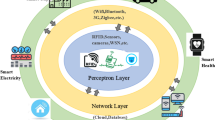Abstract
Delay/disruption tolerant network (DTN) is a rising communication criterion distinguished by intermittent connectivity. Routing algorithms in DTN are developed with the simple hypothesis that all the participating nodes collaborate with each other in storing and forwarding packets. Due to lake of centralized authority, it is difficult to protect the network against non-cooperative nodes. There may be some malicious nodes which may disrupt the forwarding strategy and insert excessive spurious traffic in order to degrade the performance of the network. This kind of misbehavior is known as flooding attack. This paper addresses this issue by using encounter record based scheme along with the trust based scheme to prevent network against Flooding attack. Encounter record table is used to check the encounter history of the receiver node and a trust metric is used to evaluate legitimacy of the received messages. Simulation outcomes show that our proposed scheme reduces the spurious traffic into the network which gives increased results for delivery probability and reduced overhead ratio.











Similar content being viewed by others
References
Gupta AK, Bhattacharya I, Banerjee PS, Mandal JK, Mukherjee A (2016) DirMove: direction of movement based routing in DTN architecture for post-disaster scenario. Wirel Netw. 22(3):723–740
Chakrabarti C, Banerjee A, Roy S (2014) An observer-based distributed scheme for selfish-node detection in a post-disaster communication environment using delay tolerant network. In: Applications and innovations in mobile computing (AIMoC), IEEE, pp 151–156
Zhou J, Song M, Song J, Zhou XW, Sun L (2014) Autonomic group key management in deep space DTN. Wirel Pers Commun 77(1):269–287
Lv X, Mu Y, Li H (2015) Loss-tolerant bundle fragment authentication for space-based DTNs. IEEE Trans Dependable Secur Comput 12(6):615–625
Lv X, Mu Y, Li H (2014) Non-interactive key establishment for bundle security protocol of space DTNs. IEEE Trans Inf Forensics Secur 9(1):5–13
Lv X, Li H (2014) Error-and loss-tolerant bundle fragment authentication for space DTNs. Front Comput Sci 8(6):1012–1023
Puri P, Singh MP (2013) A survey paper on routing in delay-tolerant networks. In: Proceedings international conference on information systems and computer networks (ISCON), IEEE, pp 215–220
Saha S, Nandi S, Verma R, Sengupta S, Singh K, Sinha V, Das SK (2016) Design of efficient lightweight strategies to combat DoS attack in delay tolerant network routing. Wirel Netw. doi:10.1007/s11276-016-1320-1
Guo H, Wang X, Cheng H, Huang M (2016) A routing defense mechanism using evolutionary game theory for delay tolerant networks. Appl Soft Comput 38:469–476
Fatimah A, Johari R (2016) Part: performance analysis of routing techniques in delay tolerant network. In: Proceedings of the international conference on internet of things and cloud computing, ACM, p 76
Guo Y, Schildt S, Pogel T, Wolf L (2013) Detecting malicious behavior in a vehicular DTN for public transportation. In: Global information infrastructure symposium, IEEE, pp 1–8
Diep PT, Yeo CK (2015) Detecting flooding attack in delay tolerant networks by piggybacking encounter records. In: 2nd international conference on information science and security (ICISS), IEEE, pp 1–4
Chen H, Lou W, Wang Z, Wang Q (2015) A secure credit-based incentive mechanism for message forwarding in noncooperative DTNs. In: Proceedings IEEE transactions on vehicular technology, vol. 9545, pp 1–1
Zhou J, Dong X, Cao Z, Vasilakos AV (2015) Secure and privacy preserving protocol for cloud-based vehicular DTNs. IEEE Trans Inf Forensics Secur 10(6):1299–1314
Ansa G, Criuckshank H, Sun Z, Al-Siyabi M (2011) A DOS-resilient design for delay tolerant networks. In: Proceedings 7th international wireless communications and mobile computing conference (IWCMC), IEEE, pp 424–429
Li Q, Gao W, Zhu S, Cao G (2013) To lie or to comply: defending against flood attacks in disruption tolerant networks. IEEE Trans Dependable Secur Comput 10(3):168–182
Chuah M, Yang P, Han J (2007) A ferry-based intrusion detection scheme for sparsely connected ad hoc networks. In: Proceedings of the 4th annual international conference on mobile and ubiquitous systems: computing, networking and services, MobiQuitous
Ren Y, Chuah MC, Yang J, Chen Y (2010) Muton: detecting malicious nodes in disruption-tolerant networks. In: Wireless communications and networking conference (WCNC), IEEE, pp. 1–6
Bucur D, Iacca G, Gaudesi M, Squillero G, Tonda A (2016) Optimizing groups of colluding strong attackers in mobile urban communication networks with evolutionary algorithms. Appl Soft Comput J 40:416–426
Lee FC, Goh W, Yeo CK (2010) A queuing mechanism to alleviate flooding attacks in probabilistic delay tolerant networks. In: Proceedings 6th advanced international conference on telecommunications (AICT), IEEE, pp 329–334
Spyropoulos T, Psounis K, Raghavendra CS (2005) Spray and wait: an efficient routing scheme for intermittently connected mobile networks. In: Proceedings of the 2005 ACM SIGCOMM workshop on delay-tolerant networking, ACM, pp 252–259
Author information
Authors and Affiliations
Corresponding author
Rights and permissions
About this article
Cite this article
Makawana, P.R., Jhaveri, R.H. Encounter record trust-based scheme against flooding attack in delay tolerant networks. Int. j. inf. tecnol. 9, 399–409 (2017). https://doi.org/10.1007/s41870-017-0046-3
Received:
Accepted:
Published:
Issue Date:
DOI: https://doi.org/10.1007/s41870-017-0046-3



